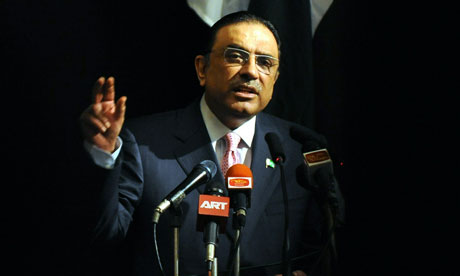Pakistani government in turmoil after coalition party quits over fuel and taxes
by editor | 2011-01-03 10:49 am
![]()
Muttahida Qaumi Movement pulls out of Asif Zardari’s government, leaving it 12 seats short of a majority
Saeed Shah in Islamabad

Asif Zardari’s coalition is 12 seats short of a majority, threatening to undermine the fight against al-Qaida. Photograph: Ishara S Kodikara/AFP/Getty Images
Pakistan was thrown into political turmoil tonight after a partner in the ruling coalition quit the government, leaving a minority administration that will struggle to survive.
The Muttahida Qaumi Movement (MQM) pulled out of President Asif Zardari’s government, leaving it 12 seats short of a majority in the national assembly or lower house of parliament. The MQM cited a rise in petrol prices and new taxation as the reason for leaving the government.
Any political instability may take the government’s focus off the fight against extremism. Pakistan’s co-operation is believed to be vital in fighting al-Qaida and in finding a solution for Afghanistan.
“Right at the start of the new year the government has raised the prices of petrol and kerosene oil, which is unbearable for the people who are already under pressure from the already high prices,” the MQM said in a statement.
Many in Pakistan will see the hand of the country’s powerful military behind the crisis. The MQM, whose leader Altaf Hussain has lived in self-imposed exile in London for almost two decades, is reputedly close to the military establishment.
The current army chief, General Ashfaq Kayani, has repeatedly said he will not intervene in politics. But the military has worked behind the scenes in the past to end civilian governments and also periodically staged coups. Zardari’s government still has two years of its five-year term left. “This is yet another move by the establishment to keep politics and democracy destabilised,” said Kamran Shafi, a columnist with Dawn newspaper. “It benefits them [the military] to prove that politicians are no good. It is just heart-breaking.”
The loss of a parliamentary majority does not automatically trigger elections. That would require a no-confidence motion being passed in parliament. Much now depends on the leader of the opposition Nawaz Sharif, who has said he will not support moves to undermine democracy.
Sharif’s party, the Pakistan Muslim League (PML-N) appeared to suggest that it would not gang up against the government in any vote of no confidence, removing the immediate threat to the administration’s survival. But some believe that Sharif may be tempted to exploit the situation, believing that he would win fresh elections.
Zardari’s pro-western government, led by the Pakistan Peoples party, came to power after elections in February 2008, which had ended military rule. Foreign aid has flowed to Pakistan since the restoration of democracy, but the administration is accused of poor governance and corruption.
Yousaf Raza Gilani, the prime minister, said: “The government will stay. Even without everyone [coalition partners], the government will stay.”
The MQM and the PPP were always uncomfortable partners, as they are fierce rivals for power in the southern province of Sindh.
Under Zardari’s government, Pakistan for the first time launched full-scale operations against Taliban extremists in the north-west of the country. But the military is thought to lack trust in Zardari’s government and has kept a tight hold on directing security and foreign policy.
Source URL: https://globalrights.info/2011/01/pakistani-government-in-turmoil-after-coalition-party-quits-over-fuel-and-taxes/